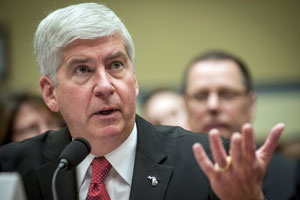75 MPH Speed Limit OK'd for Some Rural Michigan Highways

LANSING, Mich. — Gov. Rick Snyder jumped on the speed train Jan. 5 when he signed a bill boosting the state's speed limit to 75 miles per hour on about 600 miles of highways in rural areas of the state.
The bills also raise the maximum speed limit for trucks to 65 mph from 60.
“Ensuring that all Michiganders are safe while operating vehicles on our state’s roadways is critically important, and these bills allow for appropriately increased speed limits on certain roadways after safety studies are conducted,” Snyder said in a statement.
The revamped package got the necessary votes last month after the House changed the original intent to raise the speed limit to 80 mph.
The bills won’t transform the Lodge Freeway or Interstate 75 in metro Detroit into race tracks. The bills only affect about 600 miles of rural limited access freeways.
The bills would:
- After completing speed studies, require the Michigan Department of Transportation and the Michigan State Police to raise the speed limit to 75 mph on at least 600 miles of rural limited access freeway and to 65 mph on 900 miles of trunk line highway within one year of the bills’ enactment.
- Allow a county road commission in a county with more than 1 million people to request that gravel road speed limits be reduced from 55 mph. to 45 mph and local governments could request further reductions down to 35 mph.
- Allow a school superintendent to designate the half hour before and after school times when speed limits can be reduced by up to 20 mph lower than the posted speed limit. And allow hospitals to request lower speed limits near their facilities.
- Reduce the number of points that can be assessed on a driver's license from two points to one for driving 5 mph over the speed limit. Violations of 15 mph over the speed limit would come with two points on a driver's license.
- Protect local municipalities from having to pick up the cost of changing speed limit signs in their communities.
Snyder also signed a bill that would relieve communities from bearing costs on major road improvements, such as the I-75 expansion through Oakland County.
The bill replaces one that was vetoed by Snyder in July that would have relieved about 45 larger communities in the state from paying portions of the cost of highway construction projects in their towns.
The new bill, which would relieve communities from having to pay for major road projects, like the I-75 project, was a compromise between Snyder and the Legislature.
In Michigan, the road funding formula since 1951 requires the larger cities to pay for part of any freeway or major highway project coming through their city limits.




